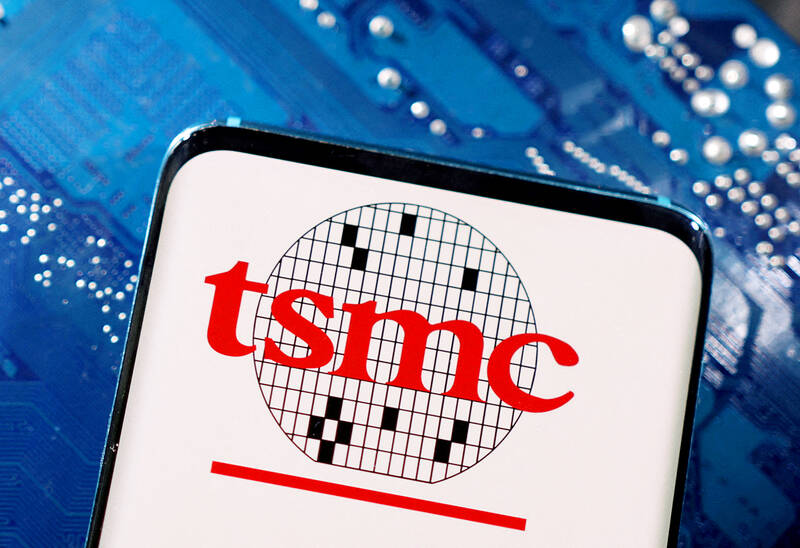Shares of contract chipmaker Taiwan Semiconductor Manufacturing Co (TSMC, 台積電) yesterday closed sharply higher, despite Berkshire Hathaway Inc announcing overnight that it had cut its holdings in the chipmaker to zero.
TSMC rose 1.92 percent to close at NT$505 on the Taiwan Stock Exchange, while the TAIEX closed up 198.85 points, or 1.28 percent, at 15,673.90, led by the bellwether electronics sector.
“Berkshire’s move to cut its holdings in TSMC to zero was widely anticipated after the investment firm sharply lowered its holdings in the company in the fourth quarter of last year,” Mega International Investment Services Corp (兆豐國際投顧) analyst Alex Huang (黃國偉) said.

Photo: Reuters
In a 13F filing, which discloses investment firms’ portfolios, with the US Securities and Exchange Commission on Monday, Berkshire said it had offloaded the remaining TSMC shares it owned.
A previous filing in February showed that Berkshire had cut its holdings in TSMC’s American depositary receipts (ADRs) by 86 percent from the third quarter of last year to about 8.3 million units in the fourth quarter.
The disposal of the large chunk of ADRs caught observers off guard because Berkshire chairman Warren Buffett has been considered a long-term investor.
In an annual general meeting held by Berkshire Hathaway early this month, Buffet said that he sold his TSMC holdings because of concerns over geopolitical risks.
“Taiwan Semiconductor is one of the best-managed companies and important companies in the world, and you’ll be able to say the same thing five, 10 or 20 years from now,” Buffett said. “I don’t like its location and re-evaluated that.”
He said there was nobody in the chip industry in TSMC’s league and called it a “marvelous company” with “marvelous people,” but said he would rather find the same kind of company in the US.
“I feel better about the capital that we’ve got deployed in Japan than in Taiwan,” he said. “I wish it weren’t so, but I think that’s the reality.”
Huang said that geopolitical concerns do not dictate the strategies of every institutional investor and that many primarily consider a company’s fundamentals.
“For me, the real concerns are whether TSMC’s sales will rebound in the third quarter as the market expects,” he said.
TSMC said at an investor conference last month that its revenue would fall 1 to 6 percent from a year earlier in US dollar terms, a downgrade from an estimate in January of “a slight increase” because of greater caution over the market outlook for this year.
International business wires reported that foreign institutional investors such as Macquarie Capital Ltd, Fidelity Investments Inc, Tiger Global Management LLC and Coatue Management LLC have raised their holdings in the Taiwanese chipmaker.
Macquarie added about 78 million units of TSMC ADRs to increase its holdings in the first quarter to about US$7.3 billion, while Fidelity bought 14.1 million new TSMC ADRs, increasing its investment in the chipmaker to almost US$4 billion, the reports said.
Tiger Global acquired US$147.8 million of TSMC ADRs in the first quarter, while Coatue built a new position in the chipmaker, buying 5.9 million shares for US$548.9 million, the reports said.

Hon Hai Precision Industry Co (鴻海精密) yesterday said that its research institute has launched its first advanced artificial intelligence (AI) large language model (LLM) using traditional Chinese, with technology assistance from Nvidia Corp. Hon Hai, also known as Foxconn Technology Group (富士康科技集團), said the LLM, FoxBrain, is expected to improve its data analysis capabilities for smart manufacturing, and electric vehicle and smart city development. An LLM is a type of AI trained on vast amounts of text data and uses deep learning techniques, particularly neural networks, to process and generate language. They are essential for building and improving AI-powered servers. Nvidia provided assistance

GREAT SUCCESS: Republican Senator Todd Young expressed surprise at Trump’s comments and said he expects the administration to keep the program running US lawmakers who helped secure billions of dollars in subsidies for domestic semiconductor manufacturing rejected US President Donald Trump’s call to revoke the 2022 CHIPS and Science Act, signaling that any repeal effort in the US Congress would fall short. US Senate Minority Leader Chuck Schumer, who negotiated the law, on Wednesday said that Trump’s demand would fail, while a top Republican proponent, US Senator Todd Young, expressed surprise at the president’s comments and said he expects the administration to keep the program running. The CHIPS Act is “essential for America leading the world in tech, leading the world in AI [artificial

DOMESTIC SUPPLY: The probe comes as Donald Trump has called for the repeal of the US$52.7 billion CHIPS and Science Act, which the US Congress passed in 2022 The Office of the US Trade Representative is to hold a hearing tomorrow into older Chinese-made “legacy” semiconductors that could heap more US tariffs on chips from China that power everyday goods from cars to washing machines to telecoms equipment. The probe, which began during former US president Joe Biden’s tenure in December last year, aims to protect US and other semiconductor producers from China’s massive state-driven buildup of domestic chip supply. A 50 percent US tariff on Chinese semiconductors began on Jan. 1. Legacy chips use older manufacturing processes introduced more than a decade ago and are often far simpler than

Gasoline and diesel prices this week are to decrease NT$0.5 and NT$1 per liter respectively as international crude prices continued to fall last week, CPC Corp, Taiwan (CPC, 台灣中油) and Formosa Petrochemical Corp (台塑石化) said yesterday. Effective today, gasoline prices at CPC and Formosa stations are to decrease to NT$29.2, NT$30.7 and NT$32.7 per liter for 92, 95 and 98-octane unleaded gasoline respectively, while premium diesel is to cost NT$27.9 per liter at CPC stations and NT$27.7 at Formosa pumps, the companies said in separate statements. Global crude oil prices dropped last week after the eight OPEC+ members said they would